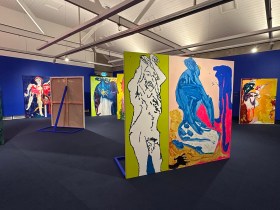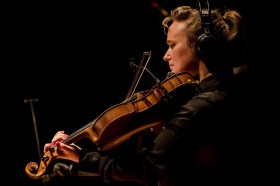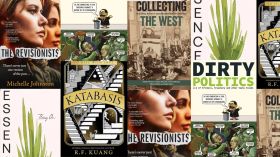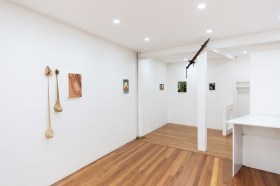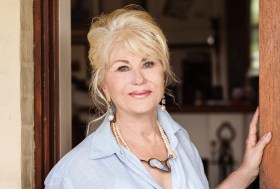Lighting design by Amelia Lever-Davidson for Ground Control, Northcote Town Hall, 2016. Photo credit: Sarah Walker.
Recently, the Ian Potter Cultural Trust completed an internal survey on its professional development grants program. The results showed approximately 70% of applicants come from only four practice areas: performing arts, music, visual arts and dance.
So why aren’t practitioners from craft, conservation, design, multimedia, literature or film applying?
‘My guess is that word of mouth is the key. For example, we get quite a lot of applications from dance and theatre makers because the people who work in those fields spread the word amongst their networks,’ said Louise Arkles, Arts Program Manager at The Ian Potter Cultural Trust.
‘Those people who are not connected to institutions and or don’t have very strong networks themselves may not know about the Trust’s grants.’
If you haven’t heard of the Ian Potter Cultural Trust, now is the time to find out more. Applications open on the 27 of March.
The Cultural Trust provides small grants of up to $7,000 to individual artists for professional development opportunities overseas. It started in 1993, when The Ian Potter Foundation established the Trust, and has a very clear goal – to encourage and support outstanding emerging and early career Australian artists.
In addition to encouraging artists from diverse practices to apply this year, the Trust also wants more applicants from outside the major cities.
‘We are really keen to reach out and ensure that people based outside the bigger cities know they are entitled to apply and we would love to hear from them. We want a stronger representation from other states and regional areas,’ said Arkles, who noted that the vast majority of applications come from people in Melbourne and Sydney.
The fine print
The grants are designed to help exceptionally talented artists undertake professional development opportunities overseas. These opportunities can be a residency, a mentorship, workshops, or other learning opportunities. The emphasis is on skills development, so applicants need to demonstrate how the proposed overseas experience will develop new skills and build upon their arts practice.
‘It is really about finding opportunities to refine your craft and to learn more about your art form. Business development doesn’t fit, but skills development does,’ said Arkles. The program does not support projects where the sole purpose is to exhibit or perform.
‘It has to be a structured professional development opportunity. But that can be a loose structure. It can be a formal course, to participate in a residency or a workshop or even some university based training such as a Masters degree. But it can also be more informal like a mentorship that is relationship-based rather than activity-based. Regardless, it still has to be structured in such a way that it’s not just one or two meetings.’
Mentorships also need to include a letter of commitment from the mentor that says they have agreed to set time aside. ‘We need a real sense that there is a true commitment from both partners,’ Arkles added.
This year the Cultural Trust wants to attract a wider pool of applicants from a range of practices including:
• Crafts
• Metalwork
• Conservation/moveable cultural heritage
• Design (e.g. graphic, fashion)
• Jewellery making (e.g. silversmithing)
• Literature/screen and script-writing/playwrights
• Multimedia
• Film
Applications from the usual suspects (performing arts, music, visual arts and dance) are still welcome to apply.
The Cultural Trust has three funding rounds per year. The next funding round opens 27 March and closes 23 May for projects or travel that commences after 22 September. The program has firm deadlines for when a project can start because, as Arkles explained, ‘we cannot fund retrospectively so the travel or the project itself must not take place before the funding is approved.’ Further rounds open in July 2017 and November 2017.
To find out more about the Ian Potter Cultural Trust grants visit http://www.ianpotterculturaltrust.org.au/funding-rounds/
Or stay updated by following The Ian Potter Cultural Trust on social media:
Facebook @ianpotterculturaltrust
Twitter @IPCulturalTrust
Instagram potterculturaltrust


